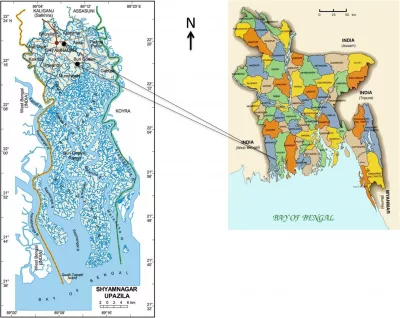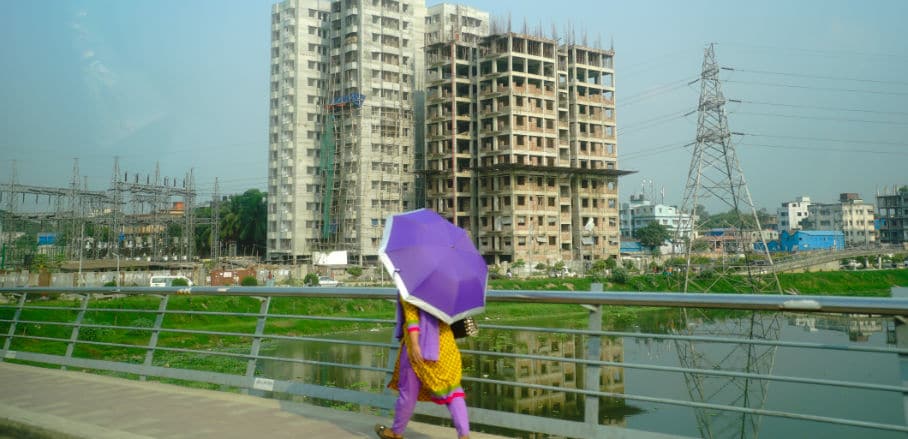Enhancing the Resilience of the Urban Poor in Bangladesh
Cities in Bangladesh are turning into “heated islands”. Due to the lack of long-term urban development measures, there is a big demand for immediate, affordable, and yet effective approaches to improve the living and environmental health conditions in poor settlements. A project proposal by Maniruzzaman Miah of ANANDO.
Bangladesh is a country with an urgent need for intervention. It has one of the highest urbanisation rates in Asia and at the same time is highly threatened by the impacts of climate change. The urban population is expected to double by 2050, with 112 million people living in cities by then. Many of the new urban dwellers are expected to be living in new, unplanned, and most likely informal neighbourhoods.
Consequences of Unplanned Growth and Climate Change
Most of the coastal cities in Bangladesh are situated on the riverbanks of low-lying tidal zones at an average elevation of 1 to 1.5 metres from sea level. Construction and management of buildings, roads, power and telecommunication transmission lines, drainage and sewerage and waste management are very difficult and vulnerable to climate change disasters. Cyclonic storms associated with tidal floods seriously impact the infrastructures and thus the livelihoods. Thus, although coastal cities are ultimate shelters during extreme events, they are not safe enough due to weak infrastructure and cannot support the coastal population.
In addition, due to conventional building design and methods, unplanned construction of roads and destruction of green spaces in urban areas, cities in Bangladesh are turning into “heated islands”. Among others, this causes severe health challenges, be it in formal as well as in informal settlements. This especially affects the elderly, children, and people with respiratory diseases. Relevant medical expenses add additional financial burdens to urban poor households, which are increasingly struggling due to limited economic opportunities and decreasing scope of labour-intensive activities. On the other hand, construction and plastic waste are mainly responsible for waterlogging as well as clogging the city drainage system.

The Bangladesh country map is adapted from http://www.maps-of-the-world.net/
How to Enhance Resilience? A Project Proposal
To protect inhabitants in urban areas against the effects of climate change, necessary steps against urban heat islands need to be taken!
The proposed project “Enhancing Resilience of Urban Poor” (ERUP) in a neighbourhood in Satkhira Pourashava will be implemented in partnership with the local government and partner NGOs with technical support from GIZ. The local administration of Satkhira and the proposed partner NGOs share a strong commitment to strengthening the resilience among the urban poor, aiming at reducing their vulnerability related to more frequent cyclones, increased temperature, and increased sea salinity. At the same time, the municipality is also focusing to mitigate long-term negative economic impacts for urban poor families induced by the ongoing pandemic.
The project focuses on different aspects and features an integrated approach. The aim is to not only improve the quality of life of individual residents of the community but also increase the quality of life for the entire community through interventions in the public space. To reduce the effects of heat islands, greening measures are implemented on, around and next to houses.
The resulting cultivation and sale of crop and ornamental plants enable women and girls to generate income and improve their livelihoods. The upgrading of an area into a public green space also serves as an educational opportunity for urban greening options at household and public space level and at the same time as space for information on climate change. A solar-powered “Climate Change Digital Learning Hub” will therefore be constructed at the public open green space. This results in the community having knowledge of climate adaptation and mitigation measures and collective awareness of impact reduction and early warning systems.
ERUP in Brief
- Reduction of heat island effect of urban poor settlement by promoting homestead gardening, rooftop gardening and used recycled construction materials and reusable plastic
- Establish a model for public green spaces to promote urban greening options at household and public space levels
- Establish a “Climate Change Digital Learning Hub (CDLH)” by using recycled construction materials to provide pictorial information on climate change impacts, early warning systems and home-based gardening
- Establish Sales cum Display Centre (SDC) to promote high-value decorative containers for agriculture (farming)
- Community-based revolving fund to be used for child education, medical expenses, or other emergency purposes as interest-free loans
- Enhancing the Resilience of the Urban Poor in Bangladesh - 22. March 2022
